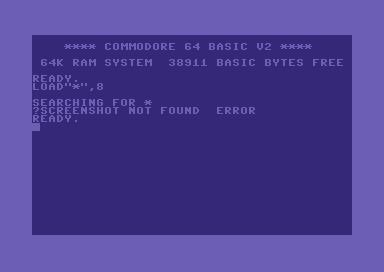|
| |
Credits :
Download :
Look for downloads on external sites:
Pokefinder.org
Summary
Submitted by Didi on 7 November 2024
dali
----
dali is a wrapper of salvador a zx0-compatible near-optimal compressor, that can also handle repeated offsets besides normal matches and literals. Salvador is written by Emmanuel Marty and is pretty fast compaed to the original zx0-compressor brought up by Einar Saukas. The tradeoff are slight differences in the pack-ration of a few bytes occasionally.
The packer/wrapper supports output of both, sfx as well as levelpacked files suitable for Bitfire
the following options are available:
-o [filename]
Set an output filename, else it will be derived from the input filename by adding an .lz extension
--sfx [$addr]
Create a c64 compatible sfx-executable that starts your code at [$addr] after depacking. Further options are available to configure the sfx-depacker.
--01 [$num] Set $01 to [num] after sfx
Address $01 in zeropage will be set to the given value after depacking, so that you end up using the right memory configuration, mostly needed when your executeable starts under basic, kernal or i/o.
--cli [$num] Do a CLI after sfx, default is SEI
Enable interrupts again after depacking, default is to leave the depacker with a SEI instruction, so interrupts do not go mayhem after disabling any ROM with $01.
--small
Use a very small depacker that fits into zeropage, but --01 and --cli are ignored and it trashes zeropage (!) whereas the normal sfx restores the zeropage from $01 - $df after depacking, $e0-$ff are trashed.
--no-inplace
Disables the inplace-decompression, and thus always an end-marker is added to the file.
--binfile
Input file is a raw binary without load-address, the load-address needed is taken from the --relocate-origin switch
--from [$num]
--to [$num]
With those two flags the file can be cut into desired slices that are then fed to the packer. This way the file can easily split up into a portion that goes up until $d000 and a portion that goes from $d000-$ffff (remember, no loading under i/o possible)
--prefix-from [$num]
Use preceeding data of file as dictionary. This requires, that the data referenced here is also in memory at the same location when depacking. You can specify from which address on the dictionary should be used.
--prefix-file [filename]
Same as above, but by handing over a file that contains the preceeding dictionary data.
--relocate-packed [$num]
Relocate packed data to desired address [$num]. The resulting file can't de decompressed inplace anymore after that, as it requires and will be equipped with an end-marker then. The --no-inplace option is not needed and set automatically.
--relocate-origin [$num]
Set load-address of source file to [$num] prior to compression. If used on bin-files, load-address and depack-target is prepended on output. |
|
|
|
 | Search CSDb |
|
 | Navigate |  |
|
 | Detailed Info |  |
|
 | Fun Stuff |  |
· Goofs
· Hidden Parts
· Trivia
|
|
 | Forum |  |
|
 | Support CSDb |  |
|
 |  |
|


